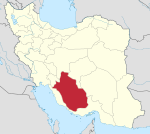Zarqan
Zarqan
Persian: زرقان | |
|---|---|
City | |
 Azadi Park in Zarqan | |
| Coordinates: 29°46′06″N 52°43′07″E / 29.76833°N 52.71861°E[1] | |
| Country | Iran |
| Province | Fars |
| County | Zarqan |
| District | Central |
| Population (2016)[2] | |
| • Total | 32,261 |
| Time zone | UTC+3:30 (IRST) |
Zarqan (Persian: زرقان)[a] is a city in the Central District of Zarqan County, Fars province, Iran, serving as capital of both the county and the district.[4] The city is served by Zarqan Airport.
Etymology
[edit]Zarqan comes from "Zarghoon", which in Pahlavi means "the place is lush."[citation needed]
History
[edit]It is said that Zarqan had good mules for hiring and transporting.[5] Therefore, this city was important for business and transportation during 1791.[6] Historically, Zaqan counted as the battle field among Afghan and Afshari dynasty.[7]
Demographics
[edit]Population
[edit]At the time of the 2006 National Census, the city's population was 19,861 in 5,127 households,[8] when it was capital of the former Zarqan District of Shiraz County.[9] The following census in 2011 counted 28,958 people in 8,112 households.[10] The 2016 census measured the population of the city as 32,261 people in 9,591 households.[2]
In 2018, the district was separated from the county in the establishment of Zarqan County, and Zarqan was transferred to the new Central District as the county's capital.[4]
See also
[edit]Notes
[edit]References
[edit]- ^ OpenStreetMap contributors (10 October 2024). "Zarqan, Zarqan County" (Map). OpenStreetMap (in Persian). Retrieved 10 October 2024.
- ^ a b Census of the Islamic Republic of Iran, 1395 (2016): Fars Province. amar.org.ir (Report) (in Persian). The Statistical Center of Iran. Archived from the original (Excel) on 6 April 2022. Retrieved 19 December 2022.
- ^ Zarqan can be found at GEOnet Names Server, at this link, by opening the Advanced Search box, entering "-3089115" in the "Unique Feature Id" form, and clicking on "Search Database".
- ^ a b Jahangiri, Ishaq (c. 2022) [Approved 7 October 1398]. Approval letter regarding the national divisions of Zarqan District, Shiraz County, Fars province. rc.majlis.ir (Report) (in Persian). Ministry of the Interior, Council of Ministers. Proposal 158356; Notification 88993/T56015H. Archived from the original on 21 April 2022. Retrieved 1 October 2023 – via Martyrdom of Imam Ali (AS) Research Center of the Islamic Council.
- ^ Matthee, Rudolph P. (9 December 1999). The Politics of Trade in Safavid Iran: Silk for Silver, 1600-1730. Cambridge University Press. pp. 50–. ISBN 978-0-521-64131-9.
- ^ Avery, Peter; Hambly, Gavin R. G.; Melville, Charles P., eds. (10 October 1991). The Cambridge History of Iran. Cambridge University Press. pp. 579–. ISBN 978-0-521-20095-0.
- ^ Axworthy, Michael (2006). The Sword of Persia: Nader Shah, From Tribal Warrior to Conquering Tyrant. I.B. Tauris. p. 103. ISBN 978-1-85043-706-2.
- ^ Census of the Islamic Republic of Iran, 1385 (2006): Fars Province. amar.org.ir (Report) (in Persian). The Statistical Center of Iran. Archived from the original (Excel) on 20 September 2011. Retrieved 25 September 2022.
- ^ Habibi, Hassan (c. 2023) [Approved 21 June 1369]. Approval of the organization and chain of citizenship of the elements and units of the national divisions of Fars province, centered in Shiraz. lamtakam.com (Report) (in Persian). Ministry of the Interior, Council of Ministers. Notification 82840/T128K. Archived from the original on 7 December 2023. Retrieved 7 December 2023 – via Lam ta Kam.
- ^ Census of the Islamic Republic of Iran, 1390 (2011): Fars Province. irandataportal.syr.edu (Report) (in Persian). The Statistical Center of Iran. Archived from the original (Excel) on 16 January 2023. Retrieved 19 December 2022 – via Iran Data Portal, Syracuse University.


